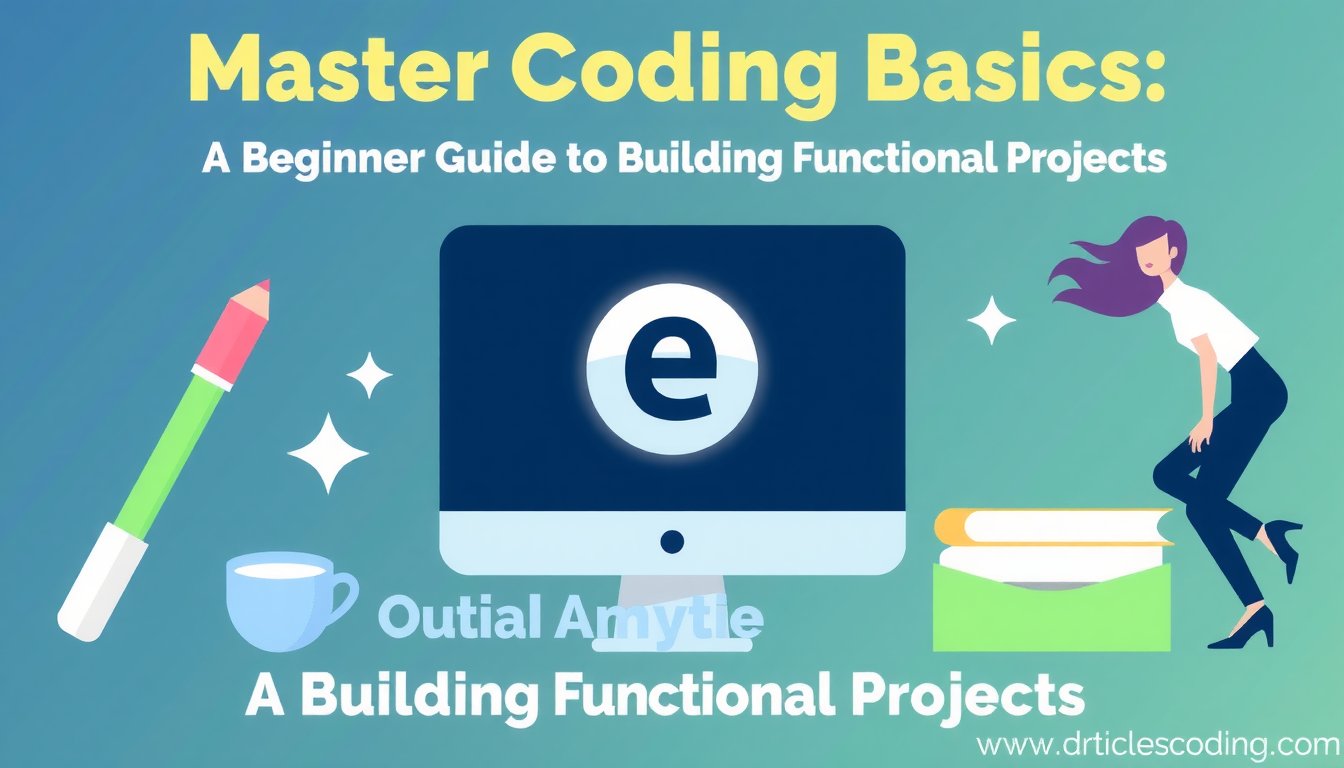The demand for coding skills has surged in recent years, with an estimated **1.4 million computer science jobs** expected to be available by 2024 in the United States alone. This statistic highlights not only the importance of coding in the modern workforce but also the urgency for beginners to master coding basics effectively. Whether you’re an aspiring entrepreneur or a freelancer looking to boost your income, learning how to code can open doors to new projects, enhance your freelance capabilities, and significantly increase your marketability. However, diving into coding can often feel daunting and overwhelming for those who are just getting started.
This guide is designed to turn that trepidation into confidence. By breaking down complex concepts into digestible sections, we’ll explore essential coding skills, practical projects for beginners, and various resources that can help you along your journey. We’ll discuss specific programming languages, showcase real-world examples, and provide step-by-step processes for building your functional projects, thus ensuring that by the end of this article, you have a clear roadmap to mastering coding basics.
Get ready to enhance your skills, explore new capabilities, and embark on your coding journey with actionable insights that will set you apart from the competition. Let’s get started!
The Foundation of Coding: Why It Matters
Before jumping into the specifics of coding languages and projects, it’s vital to understand why mastering coding basics is so crucial. Coding isn’t just for tech enthusiasts; it’s a skill that can significantly enhance your career, boost your creativity, and ultimately drive your income. Here are some compelling reasons to learn coding:
- High demand: According to the Bureau of Labor Statistics, coding jobs are growing at a rate of **13%**—faster than the average for all occupations.
- Diverse applications: Coding can be applied in various fields, from web development to data analysis and even digital marketing.
- Problem-solving skills: Learning to code sharpens analytical thinking, which can complement various other career paths.
- Freelancing opportunities: Recent data indicates that over **70% of freelancers** rely on coding skills to secure projects on platforms like Fiverr and Upwork.
By mastering coding basics, you enhance your versatility as a freelancer or entrepreneur, enabling you to tackle projects beyond your immediate specialization.
Choosing the Right Programming Language
With several programming languages available, choosing the right one to start with can be confusing. Factors like project goals, ease of learning, and community support play essential roles in this decision. Below are some of the most recommended languages for beginners:
- Python: Known for its readability and straightforward syntax, Python is excellent for beginners and is widely used in web development, data analysis, and machine learning.
- JavaScript: Essential for web development, JavaScript adds interactivity to websites. It’s a must-learn for anyone intending to work as a web developer.
- HTML & CSS: While not programming languages in the traditional sense, HTML and CSS are foundational technologies for web development and essential for structuring websites.
- Ruby: Ruby’s elegant syntax makes it a pleasure to learn, and it’s often used in web applications.
As a beginner, **Python** is frequently recommended due to its versatility and the immense support available through numerous online communities and resources.
Real-World Example: Python for Data Analysis
Consider a freelancer in the marketing domain. By learning Python, they can analyze massive datasets to understand consumer behavior better, thus providing valuable insights to clients and enhancing marketing strategies. This application can lead to better gigs and ultimately higher income.
Essential Coding Resources for Beginners
Having the right resources is crucial when you’re starting out. Various platforms offer interactive tutorials, coding challenges, and comprehensive courses that cater to beginners. Below are some standout options:
- Codecademy: Offers interactive, hands-on coding courses in various languages.
- freeCodeCamp: A nonprofit platform providing extensive free courses on web development and coding.
- Coursera: Features courses from universities covering anything from Python basics to advanced web development techniques.
- W3Schools: A rich resource for web technologies, providing beginner-friendly tutorials and examples.
These platforms not only guide you through learning but also allow you to apply what you’ve learned through projects and exercises, reinforcing your skills in real-time.
Step-by-Step Approach to Building Your First Project
One of the best ways to cement your coding knowledge is to dive straight into a project. Here’s a structured approach to building a simple project: a personal portfolio website.
Step 1: Set Goals
Determine what you want your portfolio to convey. Highlight your skills, projects, and any accomplishments that showcase your abilities. Draft a simple outline.
Step 2: Choose Your Tools
For a beginner project, you can use:
- HTML for structure
- CSS for styling
- JavaScript for interactivity
Step 3: Develop Your Content
Create the content for your site, including your bio, project descriptions, and contact information.
Step 4: Code the Website
Start coding your website using HTML for the layout, CSS for colors and fonts, and JavaScript for any functionalities. Start with the basic framework:
<!DOCTYPE html>
<html>
<head>
<title>My Portfolio</title>
<link rel="stylesheet" type="text/css" href="styles.css">
</head>
<body>
<h1>Welcome to My Portfolio</h1>
<p>Here are my projects...</p>
</body>
</html>Step 5: Review and Publish
After coding, review your website for errors. Use platforms like GitHub Pages or Netlify to publish your project easily.
Common Misconceptions about Learning to Code
As you embark on your coding journey, it’s essential to address prevalent misconceptions that might deter your learning:
- Myth: You need to be good at math: While logic is helpful, advanced math skills are not a prerequisite.
- Myth: It’s too late to learn coding: People of all ages can learn to code, and many professionals switch careers later in life.
- Myth: Other people will pick it up faster than me: Everyone learns at their own pace; consistency in practice leads to mastery.
Advanced Coding Concepts to Explore
Once you have a grasp of the basics, consider exploring advanced concepts that can further differentiate you in the market:
- Version Control: Understanding Git can dramatically enhance your capability to collaborate on projects.
- Frameworks: Familiarity with frameworks like Django for Python or React for JavaScript can streamline your development efforts.
- APIs: Knowing how to connect with and utilize APIs can greatly expand your project capabilities.
Expert Perspective: The Value of Continuous Learning
“The tech industry is always evolving. To stay relevant, you must commit to lifelong learning and adaptability.” – Jane Doe, Senior Software Engineer
Key Takeaways and Next Steps
As you conclude this guide, here are some critical takeaways:
- Mastering coding basics can unlock new freelance opportunities and enhance your professional skills.
- Start with a programming language that aligns with your goals—Python and JavaScript are both great options.
- Utilize online resources and embark on projects as a practical application of your skills.
The next steps? Choose your learning path, start building projects, and connect with fellow learners in online communities. The coding world awaits, and you’re ready to embrace it.
Whether you’re keen to start freelancing, tackle new entrepreneurial ventures, or simply learn a valuable skill, mastering coding basics is the first step on your journey. Dive in, experiment, and enjoy the vast world of code!

